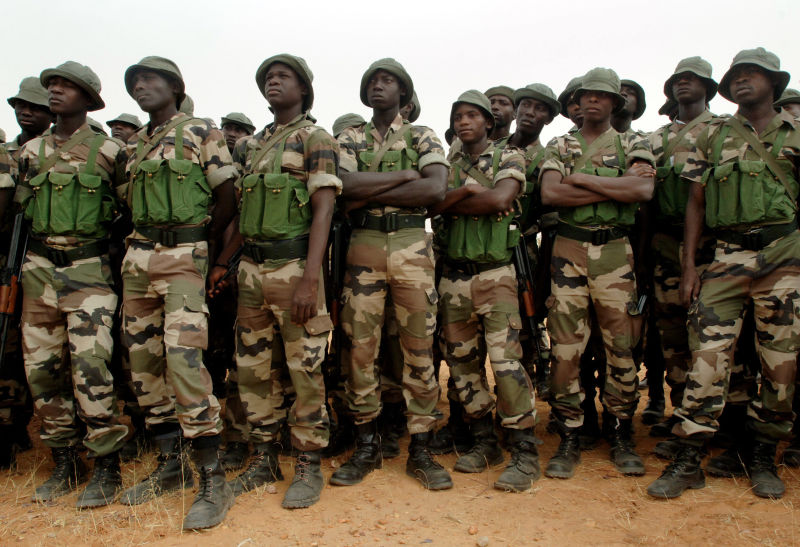
Nigerian troops warned against getting involved in politics

Maradi, Niger (April 3, 2007) – Nigerian soldiers from the 322nd Parachute Regiment line up in formation before participating in target practice facilitated by U.S. Army soldiers during Operation Flintlock 2007. The primary focus of Operation Flintlock is to provide an interactive exchange of military, linguistic and intercultural skills for both nations. U.S. Special Operations Forces depend on the ability to interface with foreign military forces in which this training is meant to enhance. The training will also help Niger to respond to threats within and across their borders to maintain security and stability. This event is part of an ongoing and long standing military-to-military relationship that the U.S. enjoys with Niger, and part of the U.S. State Department’s Trans-Sahara Counterterrorism Partnership (TSCTP). U.S. Navy photo by Mass Communication Specialist 1st Class Michael Larson. (RELEASED)
Nigerian troops have been told not to get involved in politics, the army said on Tuesday, in a warning likely to resonate given the country’s history of coups and with the president currently abroad and ailing.
Army spokesperson Sani Usman said the Chief of Army Staff, Lieutenant General Tukur Yusuf Buratai, had been told some officers and soldiers had been approached “for undisclosed political reasons”.
“On the basis of that, he has warned such persons to desist from these acts,” Brigadier General Usman said in an emailed statement, without elaborating.
“He also reminded them that (the) Nigerian Army is a thorough professional, disciplined, loyal and apolitical institution that has clear constitutional roles and responsibilities.”
Anyone wanting to get involved in politics should leave the army and any soldier “found to be hobnobbing with such elements or engaged in unprofessional conduct such as politicking would have himself or herself to blame”.
He added: “The Nigerian Army will remain apolitical and respect the Constitution of the Federal Republic of Nigeria.”
Converted democrat
Nigeria has had six successful military coups since it gained independence from Britain in 1960, leading to decades of army rule that blighted development and fostered large-scale corruption.
The current President Muhammadu Buhari is a former army general who ousted the civilian leader in December 1983 and headed a military government for some 20 months.
Civilian rule was restored in 1999.
Buhari, now 74 and describing himself as a “converted democrat”, is currently on medical leave in London for treatment to an undisclosed condition.
No date has been set for his return, fuelling speculation about the seriousness of his illness.
Vice President Yemi Osinbajo has been made acting president in his absence in line with the constitution.
Buratai put out a statement shortly after Buhari returned from a previous round of treatment in London in June last year and at a time of heightened tensions with oil rebels in the south.
It read: “Nobody is planning any coup.”






